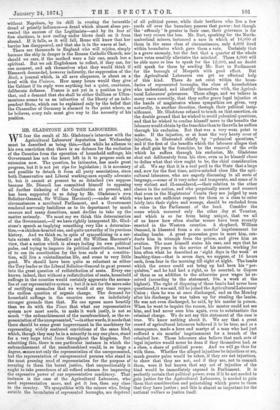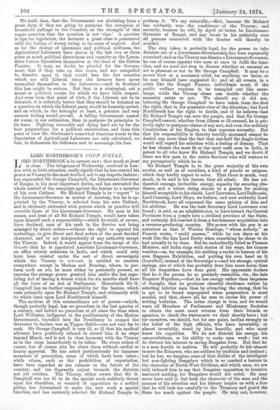MR. GLADSTONE AND THE LABOURERS.
";ATE fear the result of Mr. Gladstone's interview with the Agricultural Labourers' deputation last Wednesday must be described as being this,—that while he adheres to his own conviction that there is no defence for the exclusion of the Counties from the operation of household suffrage, his Government has not the heart left in it to propose such an extension now. The question, he intimates, has made great progress, but it is not yet ripe for legislation ; it is necessary and possible to detach it from all party associations, since both Conservative and Liberal working-men equally advocate it, but it cannot at present be so detached (we suppose because Mr. Disraeli has committed himself to opposing all further tinkering of the Constitution at present, and has been supported in so doing by Mr. Gladstone's own Solicitor-General, Sir William Harcourt) ;—under all which circumstances a moribund Parliament, and a Government rendered nervously fastidious as to its deportment by much censure and many desertions, must decline to take up the matter seriously. We must say we think this determination of the Government,—if we have rightly interpreted Mr. Glad- stone's speech as implying something very like a determina- tion,—a chicken-hearted one, and quite unworthy of its previous history. And we think so, in spite of sympathising to a cer- tain extent with Mr. Disraeli's and Sir William Harcourt's view, that a nation which is always feeling its own political pulse, and trying to improve its political constitution, instead of to use its constitution for the true ends of a constitu- tion, will live a valetudinarian life, and come to very little good. We should have been quite as reluctant as either the Tory leader or the Liberal Solicitor-General to go at present into the great question of redistribution of seats. Every one knows, indeed, that without a redistribution of seats, household suffrage in the counties would certainly aggravate the anoma- lies of our representative system ; but it is not for the mere sake of rectifying anomalies that we would at any time reopen the endless question of organic change. The demand for household suffrage in the counties rests on indefinitely stronger grounds than that. No one agrees more heartily than we do with the Times that what our representative system now most needs, to make it work justly, is not so much "the enfranchisement of the unenfranchised, as the re- presentation of the unrepresented,"—in other words, it needs that there should be some great improvement in the machinery for representing widely scattered convictions of the same kind, which, though they may be in a minority in any one place, stand for a very large total force throughout the kingdom. But admitting this, there is one particular instance in which the enfranchisement of the unenfranchised would, in so large a degree, closure not only the representation of the unrepresented, but the representation of unrepresented persons who stand in the most pressing need of representation for the purpose of securing to them the barest justice, that unquestionably it ought to take precedence of all refined schemes for improving the expressive power of our representative machinery. That instance is the case of the Agricultural Labourers, who need representation more, and get it less, than any class in the country. We sympathise with the miners who, living outside the boundaries of represented boroughs, are deprived of all political power, while their brethren who live a few yards off over the boundary possess that power ; but though the tufbmaly ' is greater in their case, their grievance is for that very reason the less. Mr. Burt, speaking for the North- umberland miners, instanced a case in which of 16,000 of them in the same class of circumstances, only 4,000 lived within boundaries which gave them a vote. Certainly that is a grave anomaly, but the fact that a quarter of the whole have votes sensibly alleviates the mischief. Those 4,000 will be able more or less to speak for the 12,000, and no doubt will speak for them by sending Mr. Burt to Parliament
for the borough of Morpeth with good effect. But the Agricultural Labourers can get no effectual help
of this kind. There do not exist within the boun- daries of represented boroughs, the class of householders who understand, and identify themselves with, the Agricul- tural Labourers' grievances. These allege, and we believe in many cases correctly, that they suffer grave legal injustice at the hands of magistrates whose sympathies are given, very naturally, in another direction, through their political insig- nificance. Mr. Gladstone refused to touch on that assertion, on the double ground that he wished to avoid polemical questions, and that he wished to confine himself more to the benefits the labourer would obtain by the franchise than to the evils he suffers through his exclusion. But that was a very weak point to make. If the injustice, or at least the very heavy sense of injustice, is illustrated chiefly by " polemical questions," and if the first of the benefits which the labourer alleges that he shall gain by the franchise, be the removal of the evils which he suffers through his exclusion, Mr. Gladstone shut out deliberately from his view, even as he himself chose to define what that view ought to be, the chief consideration of all. We say that it is a real peril to the State that a large and, now for the first time, active-minded class like the agri- cultural labourers, who are eagerly discussing in all sorts of language,—some of it very sober and temperate, and some of it very violent and ill-considered,—their relation to the other classes in the nation, and who perpetually assert and reassert that even in the Magistrates' Courts they are judged by men who have not sufficient respect for them as a class to enter fairly into their rights and wrongs, should be excluded from a voice in the Parliament of the land. Consider the scene which occurred only the other day at Taunton, and which is so far from being unique, that we all of us know how often similar scenes have been recently enacted in the Western counties. A shepherd, William Osmond, is liberated from a six months' imprisonment for stealing lambs. A great procession goes to meet him, con- ducts him in triumph from the prison, and gives him an ovation. The man himself states his ease, and says that he had been 20 years in the service of his master, working for him often what he described as eight days in the week' at lambing-time—that is seven days, we suppose, of 16 hours each, from four in the morning till eight at night. The lambs which the owner could not bring up had been his " per- quisites," and he had had a right, as he asserted, to dispose of them as an addition to the otherwise poor wages he re- ceived (according to the statement, 10s. a week at the highest). The right of disposing of these lambs had never been questioned,it was said, till he joined the AgriculturalLabourers' Union ; then he was at once discharged, and on the Monday after his discharge he was taken up for stealing the lambs. He was not even discharged, he said, by his master in person. When he went to inquire the reason, his master could not see him, and had never seen him again, even to substantiate the criminal charge. We do not say this statement of the case is true. We know nothing about it. We say that a great crowd of agricultural labourers believed it to be true, and as a consequence, made a hero and martyr of a man who had just suffered a six months' imprisonment for a breach of the criminal law. These labourers also believe that such acts of legal injustice would never be done if they themselves had, as a class, a share of political power. And we will go thus far with them. Whether the alleged injustices be injustices or no, much greater pains would be taken, if they are not injustices, to show that they are not, and if they are, not to commit them, were it but known that any act of injustice of the kind would be immediately exposed in Parliament. It is perfectly certain that political power, even if it be not needed to gain justice for the Agricultural Labourers, is needed to gain them that consideration and painstaking which prove to them that they have justice ; and this is almost as important for the national welfare as justice itself. great duty, if they are going to postpone the extension of household suffrage to the Counties, on the strength-of this vague assertion that the question is not ripe.' A question is ripe for legislation, the moment a great class is penetrated with the feeling of wrong owing to its sense of neglect. And as for the charge of ignorance and political unfitness, the Agricultural Labourers have shown in the last two or three years as much political shrewdness and capacity as the Lanca- shire Cotton Operatives themselves at the time of the Cotton Famine. It may, no doubt, be pleaded for the Govern- ment that if they take up this cause, and are compelled to dissolve upon it, they would lose the few counties which are still Liberal, since the farmers have never reconciled themselves to the Labourers,—and in Scotland this loss might be serious. But that is a strategical, not a moral or political, excuse for which we have little respect. And-even from that point of view, if the Liberals are to be defeated, it is infinitely better that they should be defeated on a question on which the Liberal party would be honestly united, and on which, in the boroughs at least, a genuine and very earnest feeling would prevail. A falling Government cannot do worse, in our estimation, than to postpone its principles to its fears. Fighting staunchly and dying hard are by far the best preparations for a political resurrection, and from this point of view Mr. Gladstone's somewhat timorous words to the deputation of Agricultural Labourers are only calculated, we fear, to dishearten his followers and to encourage his foes.



































 Previous page
Previous page